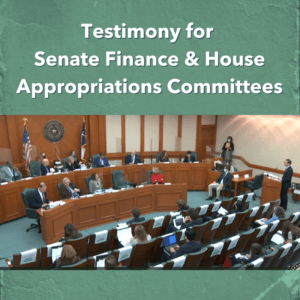
First, thank you for ensuring the state honors the commitments made to public schools and property taxpayers during the last legislative session through House Bill 3. The resources provided for schools and teachers were and are greatly appreciated. At the time those resources were committed, none of us could begin to imagine what the next two years would bring.
When the coronavirus hit last spring, schools had to quickly shift to remote learning. Students lost months of classroom instruction. The virus has continued to disrupt learning throughout the current school year, and the recent winter storm with resulting power outages and damages that cost some schools more than a week of instruction when they could least afford to lose it.
Despite these mounting challenges, public schools have gone above and beyond to meet the needs of students —by continuing to provide meals to qualifying students when buildings were closed, figuring out how to continue learning remotely (often with limited tools, training, and connectivity), and by actively seeking to re-engage students who did not re-enroll in school—by literally knocking on doors, setting up phone banks, and tenaciously finding those who have lost months of instruction.
The cumulative learning loss—among students who have yet to re-enroll and the ones who have been trying to engage as best they can in trying circumstances—threatens to take a significant and lasting toll. Schools need the additional resources like those provided through federal coronavirus relief legislation to overcome the challenges of this unique moment in time.
As you look for one-time expenses in which to invest these dollars, we ask that you provide aid to schools to address the learning loss caused by these disruptions. We believe that making up for the instructional time lost to this unprecedented pandemic and this punishing storm clearly qualifies as a one-time investment…an investment that will make a long-term difference in students’ academic success.
And as you make investments to address learning loss, please recognize the diverse needs of school districts throughout Texas. School districts need local control and flexibility, not a program purchased by TEA that fails to meet the diverse needs of Texas students. A one-size-fits-all approach is often wasteful and inefficient. Set parameters for the use of funds, but please don’t have TEA purchase a big-ticket program like the Texas Home Learning Network that misses the mark on what many schools and students need.
Finally, we ask that this Committee remain mindful of the ever-growing cost of property tax compression in years to come. As school districts subject to recapture, we are well aware of the need for property tax relief. But that cost should not come at the expense of students. Investments in property-tax compression, while important, are not investments in learning. And as the cost of tax compression continues to escalate, please ensure the State does not divert dollars away from the education of students to pay that costly bill.
It’s been a tough year for our state and our public schools, but the commitment of Texas school districts is stronger than ever. We appreciate your work on this budget to prioritize the needs of Texas students.
